Papers of Sidney Alexander Beveridge - Part 1
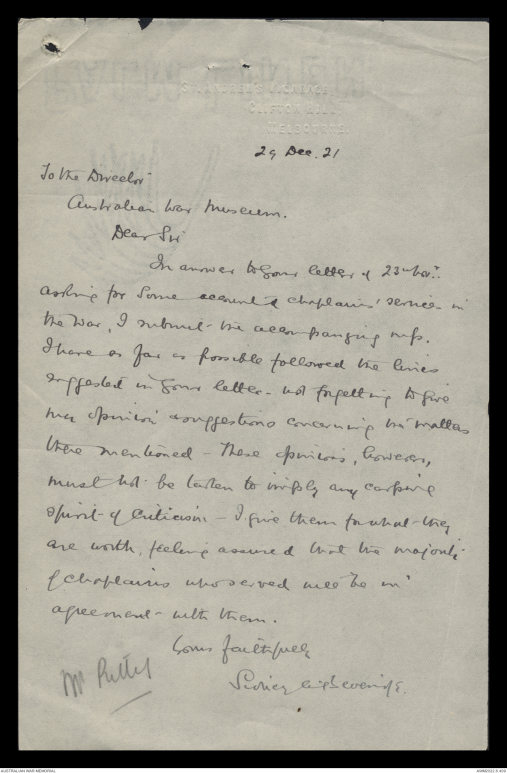
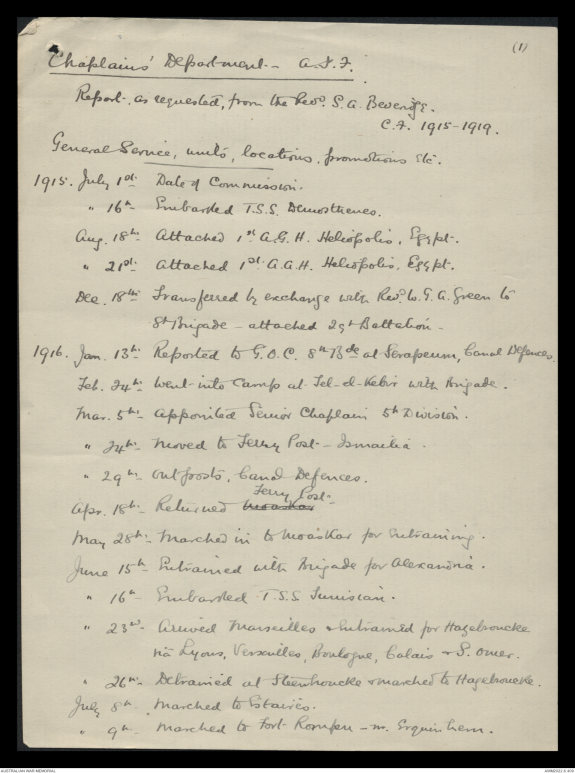
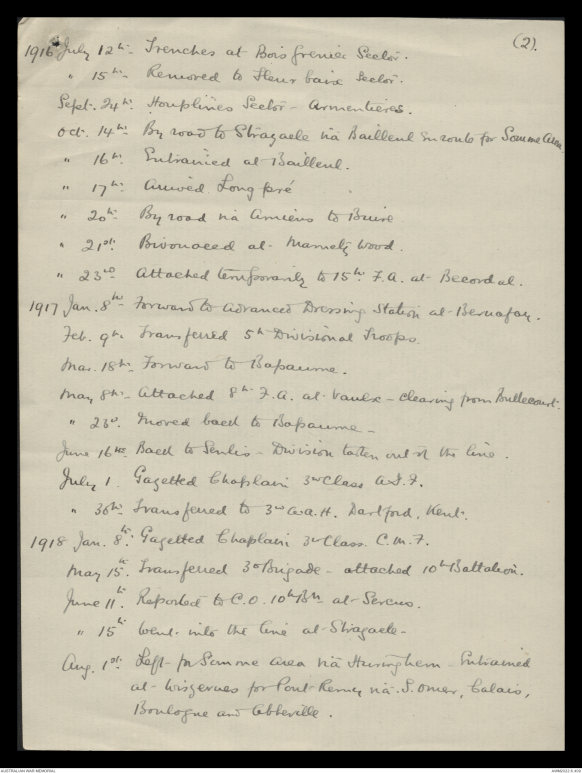
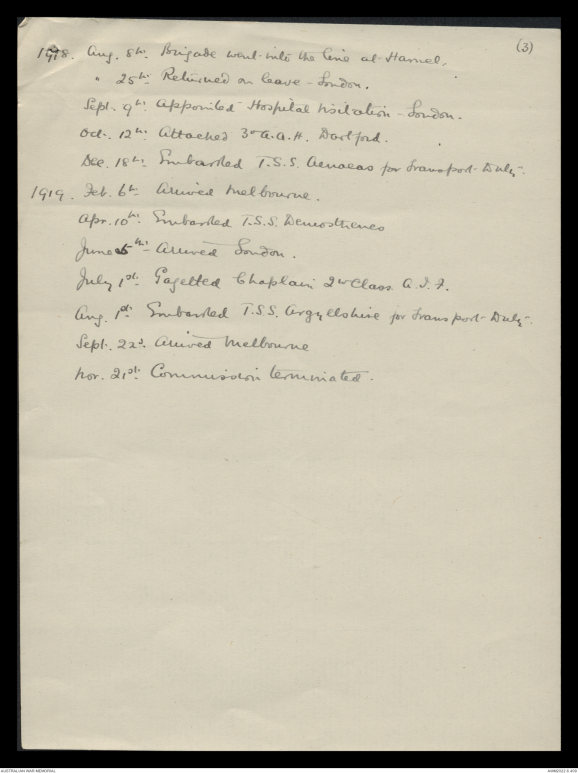
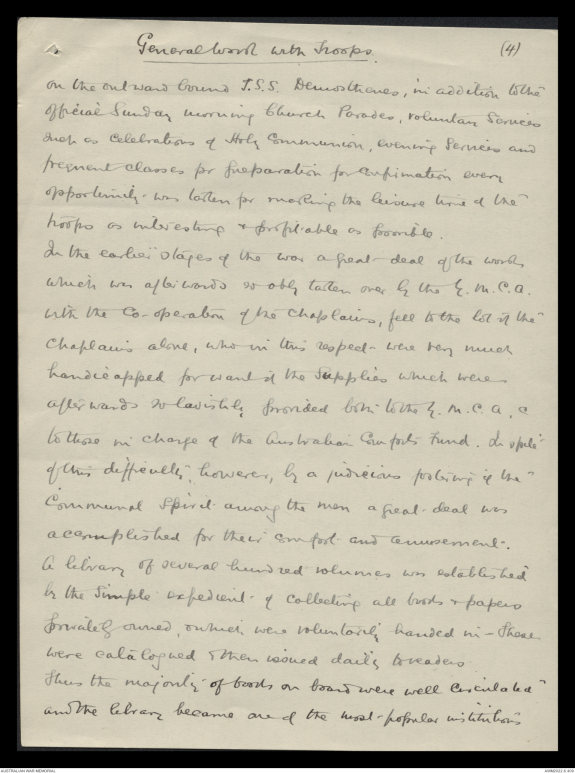
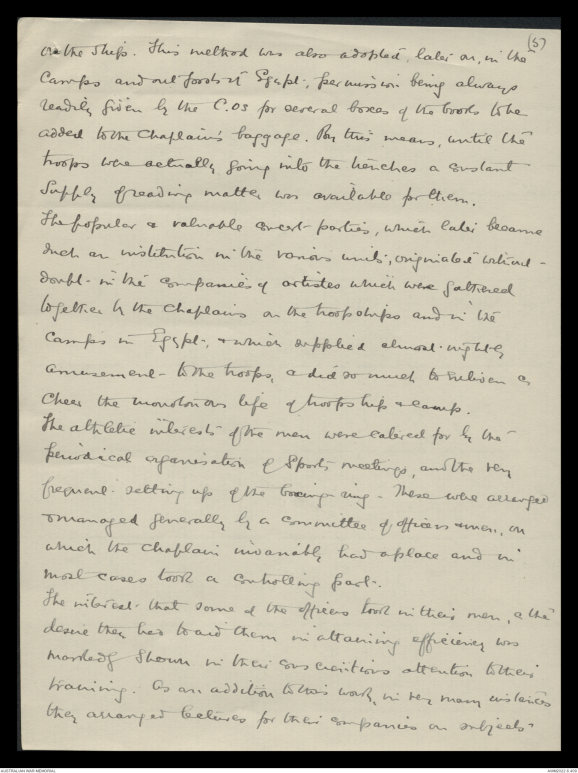
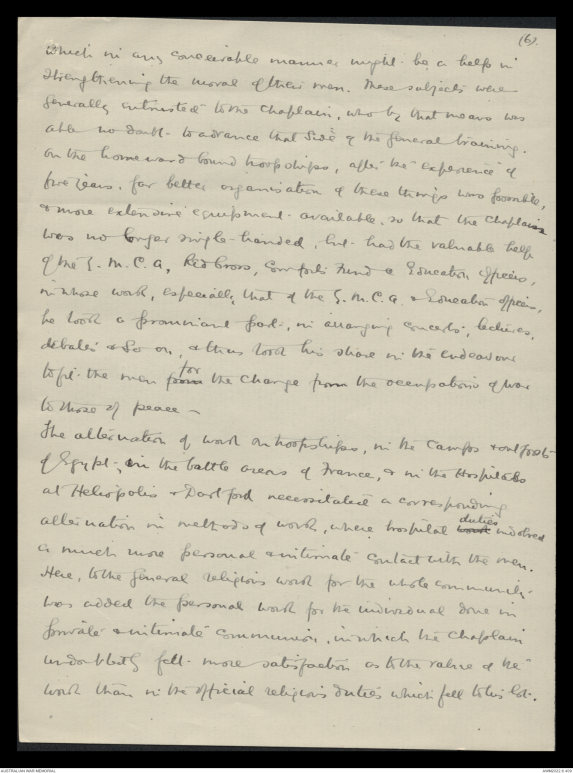
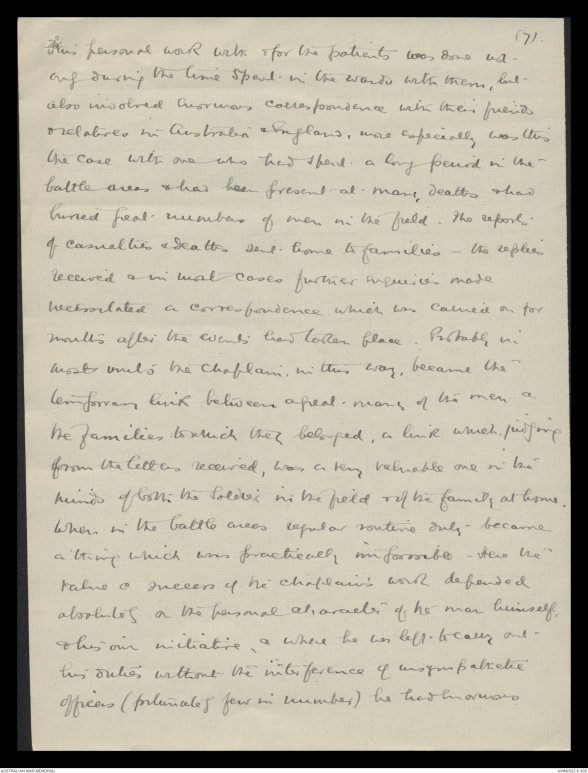
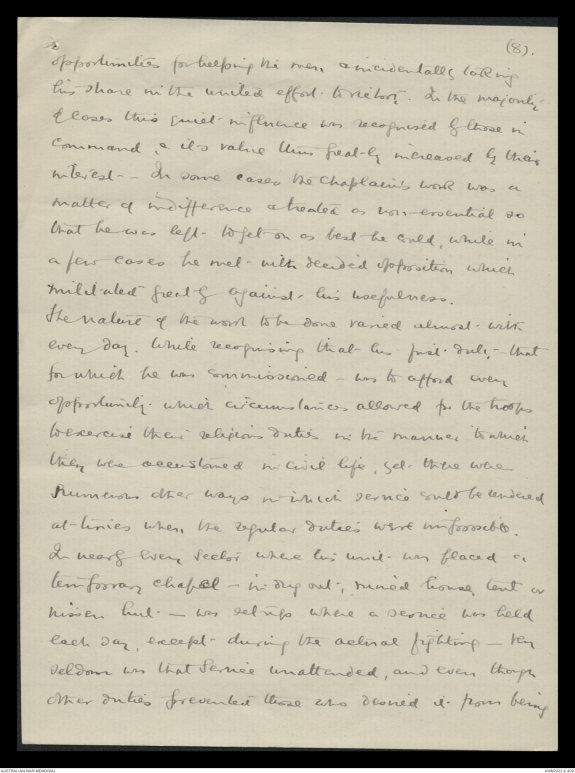
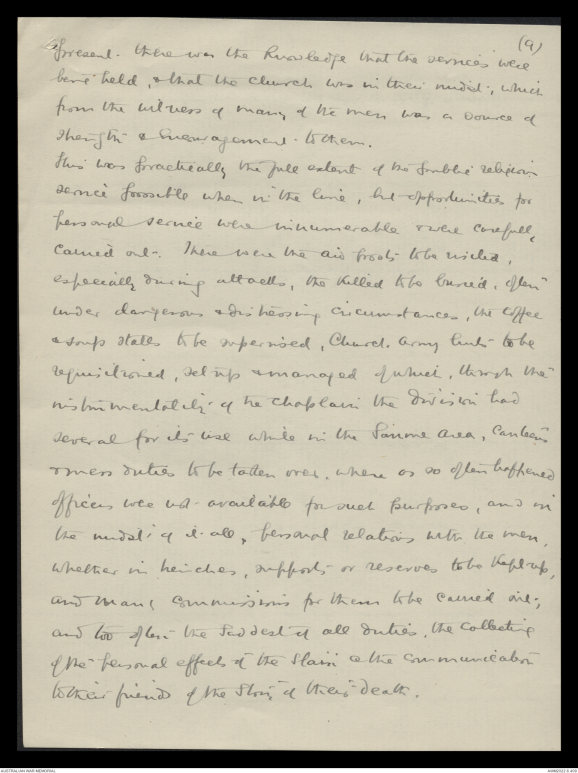
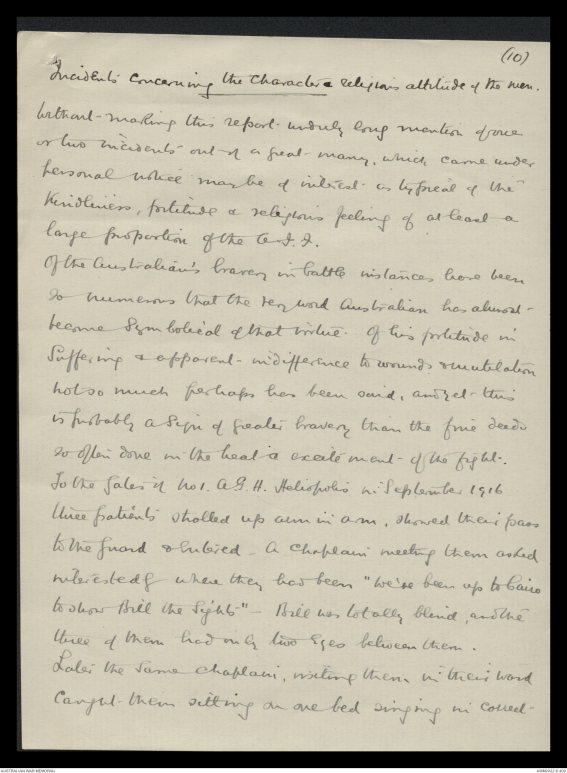
29 Dec. 21
To the Director
Australian War Museum.
Dear Sir
In answer to your letter of 23 Nov
asking for some accounts of chaplains' service in
the war, I submit the accompanying info.
I have as far as possible followed the lines
suggested in your letter. Not forgetting to give
my opinion & suggestions concerning the matters
there mentioned. These opinions, however,
must not be taken to imply any carping
spirit of criticism. I give them for what they
are worth, feeling assured that the majority
of chaplains who served will be in
agreement with them.
Your faithfully
Sidney A Beveridge
Mr [[Pulty/Reiley?]]
(1)
Chaplains' Department. - A.I.F.
Report as requested, from the Revd S. A. Beveridge.
C.F. 1915-1919.
General Service, units, locations, promotions etc.
1915.
July 1st Date of Commission.
" 16th Embarked T.S.S. Demosthenes.
Aug 18th Attached 1st A.G.H. Heliopolis, Egypt.
“ 21st Attached 1st A.G.H. Heliopolis, Egypt.
Dec 18th Transferred by exchange with Revd. W.G.A. Green to
8th Brigade - attached 29th Battalion.
1916.
Jan 13th Reported to G.O.C. 8th Bde at Serapeum, Canal Defences.
Feb. 24th Went into Camp at Tel-el-Kebir with Brigade.
Mar. 5th Appointed Senior Chaplain 5th Division.
" 24th Moved to Ferry Post - Ismailia.
" 29th Outposts, Canal Defences.
Apr 18th Returned xxxx Ferry Post.
May 28th Marched in to Moaskar for entraining.
June 15th Entrained with Brigade for Alexandria.
" 16th Embarked T.S.S. Tuscania.
" 23rd Arrived Marseilles & entrained for Hazebroucke
via Lyons, Versailles, Boulogne, Calais & S. Omer.
" 26th Detrained at Steenbroucke & marched to Hazebroucke.
July 8th Marched to Estaires.
" 9 th Marched to Fort Romfeu - nr. Erquinheim.
(2).
1916
July 12th Trenches at Bois Grenier Sector.
" 15th Removed to Fleur baix Sector
Sept. 24th Houplines Sector - Armentieres.
Oct. 14th By road to Strazeele via Bailleul en route for Somme area
" 16th Entrained at Bailleul.
" 17th Arrived Longpré
" 20th By road via Amiens to Buire
" 21st Bivouaced at Mametz Wood.
" 23rd Attached temporarily to 15th F.A. at Becordal.
1917
Jan. 8th Forward to Advanced Dressing Station at Beruafar.
Feb. 9th Transferred 5th Divisional Troops.
Mar. 18th Forward to Bapaume.
May 8th Attached 8th F.A. at Vaulx- clearing from Bullecourt
” 23rd Moved back to Bapaume.
June 16th Back to Seulis - Division taken out of the line.
July 1 Gazetted Chaplain 3rd Class A.I.F.
" 30th Transferred to 3rd A.A.H. Dartford, Kent.
1918
Jan. 8th Gazetted Chaplain 3rd Class. C.M.F.
May 15th Transferred 3rd Brigade - attached 10th Battalion.
June 11th Reported to C.O. 10Bn at Sercees.
" 15th Went into the line at Stragaete.
Aug. 1st. Left for Somme Area via Huringhem Entrained
at Wiszernes for Port Remy via Somer, Calais,
Boulogne and Abbeville.
(3)
1918.
Aug 8th. Brigade went into the line at Hamel.
" 25th. Returned on leave - London.
Sept. 9th. Appointed Hospital Visitation - London
Oct 12th. Attached 3rd A.A.H. Dartford.
Dec 18th. Embarked T.S.S. Aenoeas for Transport Duty
1919 Feb 6th. Arrived Melbourne.
Apr. 10th. Embarked T.S.S. Demosthenes
June 5th. Arrived London.
July 1st. Gazetted Chaplain 2nd Class A.I.F.
Aug. 1st. Embarked T.S.S. Argyllshire for Transport Duty.
Sept. 22nd Arrived Melbourn
Nov. 21st. Commission terminated.
(4)
General Work with Troops
On the outward bound T.S.S. Demosthenes, in addition to the
official Sunday morning Church Parades, voluntary Services
such as Celebrations of Holy Communion, evening services and
frequent classes for preparation for confirmation every
opportunity was taken for making the leisure time of the
troops as interesting & profitable as possible.
In the earlier stages of the war a great deal of the work
which was afterwards so ably taken over by the A.M.C.A.
with the co-operation of the chaplains, fell to the lot of the
chaplains alone, who in this respect were very much
handicapped for want of the supplies which were
afterwards so lavishly provided both to the A.M.C.A, &
to those in charge of the Australian Comforts Fund. In spite
of this difficulty, however, by a judicious fostering of the
Communal Spirit among the men a great deal was
accomplished for their comfort and amusement.
A library of several hundred volumes was established
by the simple expedient of collecting all books & papers
privately owned, & which were voluntarily handed in - These
were catalogued & then issued daily to readers.
Thus the majority of books on board were well circulated
and the library became one of the most popular institutions
(5)
on the ship. This method was also adopted later on, in the
camps and outposts in Egypt, permission being always
readily given by the C.Os for several boxes of the books to be
added to the Chaplain's baggage. By this means, until the
troops were actually going into the trenches a constant
supply of reading matter was available for them.
The popular & valuable concert parties, which later became
such an institution in the various units, originated without
doubt in the companies of artistes which were gathered
together by the chaplains on the troopships and in the
camps in Egypt, & which supplied almost nightly
amusement to the troops, & did much to enliven &
cheer the monotonous life of troopships & camps.
The athletic interests of the men were catered for by the
periodical organisation of sports meetings, and the very
frequent setting up of the boxing ring. These were arranged
& managed generally by a committee of officers & men, on
which the chaplain invariably had a place and in
most cases took a controlling part.
The interest that some of the officers took in their men, & the
desire they had to aid them in obtaining efficiency was
markedly shown in their conscientious attention to their
training. As an addition to this work, in very many instances
they arranged lectures for their companies on subjects
(6)
which in any conceivable manner might be a help in
strengthening the moral of their men. These subjects were
generally entrusted to the chaplain, who by that means was
able no doubt to advance that side of the general training.
On the homeward bound troopships, after the experience of
five years, far better organisation of thee things was possible,
& more extensive equipment available, so that the chaplain
was no longer single-handed, but had the valuable help
of the A.M.C.A, Red Cross, Comforts Fund & Education Officers,
in whose work, especially that of the A.M.C.A. & Education Officers,
he took a prominent part, in arranging concerts, lectures,
debates & so on, & thus took his share in the endeavours
to fit the men from for the change from the occupations of war
to those of peace -
The alternation of work on troopships, in the camps & outposts
of Egypt, in the battle areas of France, & in the Hospitals
at Heliopolis & Dartford necessitated a corresponding
alternation in methods of work, where hospital work duties involved
a much more personal & intimate contact with the men.
Here, to the general religious work for the whole community
was added the personal work for the individual done in
private & intimate communion, in which the chaplain
undoubtedly felt more satisfaction as to the value of the
work than in the official religious duties which fell to his lot.
(7)
This personal work with & for the patients was done not
only during the time spent in the wards with them, but
also involved enormous correspondence with their friends
& relatives in Australia & England, more especially was this
the case with one who had spent a long period in the
battle areas & had been present at many deaths & had
buried great numbers of men in the field. The reports
of casualties & deaths sent home to families - the replies
received & in most cases further enquiries made
necessitated a correspondence which was carried on for
months after the events had taken place. Probably in
most units the chaplain, in this way, became the
temporary link between a great many of the men &
the families to which they belonged, a link which, judging
from the letters received, was a very valuable one in the
minds of both the soldiers in the field & of the family at home.
When in the battle areas regular routine only became
a thing which was practically impossible - here the
value & success of the chaplain's work depended
absolutely on the personal character of the man himself
& his own initiative, & where he was left to carry out
his duties without the interference of unsympathetic
officers (fortunately few in numbers) he had enormous
(8).
opportunities for helping the men & incidentally taking
his share in the united effort to victory. In the majority
of cases this quiet influence was recognised by those in
command & its value thus greatly increased by their
interest - In some cases the chaplain's work was a
matter of indifference & treated as non-essential so
that he was left to get on as best he could, while in
a few cases he met with decided opposition which
militated greatly against his usefulness.
The nature of the work to be done varied almost with
every day. While recognising that his first duty - that
for which he was commissioned - was to afford every
opportunity which circumstances allowed for the troops
to exercise their religious duties, in the manner to which
they were accustomed in civil life, yet there were
numerous other ways in which service could be rendered
at times when the regular duties were impossible.
In nearly every sector where his unit was placed a
temporary chapel - in dug out, ruined house, tent or
missen hut - was setup where a service was held
each day, except during the actual fighting - very
seldom was that Service unattended, and even though
other duties prevented those who desired it from being
(9)
present, there was the knowledge that the services were
being held, & that the church was in their midst, which
from the witness of many of the men was a source of
strength & encouragement to them.
This was practically the full extent of the public religious
service possible when in the line, but opportunities for
personal service was innumerable & were carefully
carried out. There were the aid posts to be visited,
especially during attacks, the killed to be buried, often
under dangerous & distressing circumstances, the coffee
& soup stalls to be supervised, Church Army huts to be
requisitioned, set up & managed of which, through the
instrumentality of the chaplain the Division had
several for its use while in the Somme area, canteens
& mess duties to be taken over, were as so often happened
officers were not available for such purposes, and in
the midst of it all, personal relations , with the men,
whether in trenches, supports or reserves to be kept up,
and many commissions for them to be carried out;
and too often the saddest of all duties the collecting
of the personal effects of the slain & the communication
to their friends of the story of their death.
(10)
Incidents concerning the character & religious attitude of the men.
Without making this report unduly long mention of one
or two incidents out of a great many, which came under
personal notice may be of interest as typical of the
kindliness, fortitude & religious feeling of at least a
large proportion of the A.I.F.
Of the Australian's bravery in battle instances, have been
so numerous that the very word Australian has almost
become symbolical of that virtue. Of his fortitude in
suffering & apparent indifference to wounds & mutilation
not so much perhaps has been said, and yet this
is probably a sign of greater bravery than the fine deeds
so often done in the heat & excitement of the fight.
To the Gates of No 1. A.G.H Heliopolis in September 1916
three patients strolled up arm in arm, showed their pass
to the Guard & entered. A Chaplain meeting them asked
interested of where they had been "we've been up to Cairo
to show Bill the sights" - Bill was totally blind, and the
three of them had only two eyes between them.
Later the same chaplain, visiting them in their ward
caught them sitting on one bed singing in correct
 Sandy Mudie
Sandy MudieThis transcription item is now locked to you for editing. To release the lock either Save your changes or Cancel.
This lock will be automatically released after 60 minutes of inactivity.